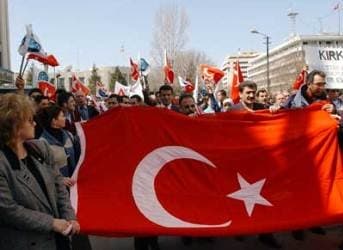After losing its empire to the Western powers at the close of WWI in 1918, Turkey is now making a comeback in the region, a policy that has many people questioning the wisdom of Prime Minister Erdogan’s policies.
Indeed, after continuous delays in being granted entry into the European Union Turkey had little choice but to turn eastwards once more. A move that was quite predictable in view of the EU’s stance vis-à-vis Turkey.
But the reappearance of Turkey in Arab politics has many asking if Ankara’s politics are wise, or is Turkey about to become dragged into more than it bargained for?
Senior Turkish diplomats in the region admit that the situation in Syria, in which Turkey is now directly concerned has Ankara “very worried.” And with just cause.
Turkey shares a long border with Syria and like its neighbor to its south has large numbers of minority groups, including Alawites and Kurds, both of which play important roles in Syria. The danger of having the conflict extend into Turkey is something that is very present in the minds of Turkish leaders.
Having taken a clear stand in the Syrian conflict in favor of the opposition fighting the regime of President Bashar Assad now places Turkey as one of the many actors in this conflict that is taking on new forms day by day and with no predictable outcome on the horizon.
Already Turkey has had one of its warplanes shot down over Syria earlier this summer and a number of its citizens were abducted in Beirut two weeks ago.
“The situation is difficult to predict,” the diplomatic source said, in reference to the current unrest in Syria. To say the least, it is highly unpredictable. And so too are Turkey’s role and political ambitions in the Middle East.
Right now Turkey and Iran are vying for a leadership role in the Middle East, trying to win the hearts and minds of the Arab countries. In view of the current lack of traditional Arab leadership there is an open position to be filled.
Egypt, Syria and Iraq, the more traditional leaders in the Arab world are currently preoccupied by their domestic problems.
Oil-rich Saudi Arabia and Qatar have been trying to pick up the slack but they come with a handicap: the Gulf countries, while they have the necessary cash on hand thanks to the oil revenues they nevertheless lack the charismatic clout andhistoric political appeal needed to draw in the masses from the street that leaders from Egypt and Syria and to a lesser degree, Iraq, were capable of drawing in the past.
And much like Turkey, they too, have come out in full support of the Syrian opposition. As a result neither Riyadh nor Doha can be seen as honest brokers in the Syrian conflict.
In their efforts to stake their claim in the Arab world both Ankara and Tehran are reaching out through new media projects aimed at the Arab world. Iran has invested millions in television broadcast in Press TV, in English, and Al-Alam, in Arabic, and is pressing ahead with plans for even more broadcasting channels in Arabic based in Beirut. Similarly, Anadolu Agency, Turkey’s government run news agency is enlarging its Arabic service, opening up bureaus across the region and hiring staff to report in Arabic.
While the voices objecting to Iranian involvement may be muted, many in Turkey question if bringing Turkey into the fray of Middle East politics does not simply extend the conflict, or as some foresee, reviving old wounds from the days with the Ottoman Empire ruled the Levant and beyond.
Memories in this part of the world tend to linger. As a young Kosovar Albanian once said to me, “We used to be Christian but now we are Muslim.” Somewhat confused I asked him, what exactly did he mean by “we used to be Christian?”
“Of course,” he said, “Seven-hundred and fifteen years ago we were Christians.”
By. Claude Salhani for Oilprice.com
Claude Salhani, a specialist in conflict resolution, is an independent journalist, political analyst and author of several books on the region. His latest book, 'Islam Without a Veil,' is published by Potomac Books. He tweets @claudesalhani.



















There is still some ambiguity over whether that Turkish olane was shot down over Syria or over the Med; Syrian waters or international?
Memories and ambiguities are it seems what the ME is all about, much of the time...
Dear mate the Greeks never call themselves as Greeks, this is inaccurate, this was imposed by Turkish and still works today and maintained by Greeks for tourist promotion reasons. The Greeks call themselves Hellenes in everyday modern Greek language, as they did 4500 years ago in ancient Greek. Please also note that the Greeks you like to call them are now Christians but 5000 years ago believed in the 12 gods of Mount Olympus, Christians today they are, but Mount Olympus is still standing there as well as the island of Patmos were St. John conceive the book of revelation.
Cheers mate.